Memories
of Growing Up - What did we do for Entertainment?
By Axel Boilesen, 2012
When I was in war (WWII) I was
some place in Germany going through the line in a mess tent
when I heard "Hi Neighbor. What would you like?" When
I looked up it was Leonard Vlach, a neighbor of mine who lived
about a mile west of our Cotesfield farm. His greeting sounded
so casual, just like we had seen each other every morning and
nothing had changed. Leonard was my brother Floyd's age, about
7 years older than me.
His family were hard working neighbors
and I can remember that when they ate at our house I could hardly
get Leonard to pass the potatoes around our big table. The bowl
would come to him and he wouldn't pass it on saying "I
don't want any." He was the least likely person you'd ever
expect to see in a kitchen.
But there Leonard was, serving
hundreds of soldiers, acting like the Maitre d' of a fine restaurant.
Thinking of Leonard reminded me
of the polka dances that were held in their barn years earlier
when I was growing up. Leonard's family had a big new barn and
I can remember how the hay loft opened up and it seemed like
the barn was almost built for dancing. There was polka music
and waltzes, and the Hotsy Totsy Boys and many other groups
that came to perform in that barn.
I don't think there was any admission
charge but some free-will collection covered expenses. Probably
half of the music was Czech and the other half Danish. At any
gathering it wasn't unusual for some of the Danes to pull out
their accordian and start playing or fiddling. It seemed like
it was in their genes. So music was appreciated by all and an
important part of our social life.
We went to dances as a family
driving in the farm wagon pulled by our horses. I can remember
thinking my mom had a glow on her cheeks when she was ready
to go out. She would fix her hair in curls and she just had
a different way about how she acted for certain events. It's
something I've always remembered.
Polka night was on Saturday nights.
I first went as a really little boy. At that age I was probably
carried home and remember acting like I was asleep whether I
was or not. We always went as a family. You didn't ask about
going or not going. The dances were a pretty good workout and
I remember sweating alot. I don't remember the odor even though
we were in a barn and it was summertime. I just remember the
sweating and everybody having a good time. I always wished that
I had been a little more of a dancer.
I don't remember how often the
dances were held but it took some preparation to get a barn
ready for a dance. They pushed the straw and manure into the
corner of the barns so you had to be careful when walking around
those edges. Perhaps refreshments were served at the dances
and maybe deserts like kolaches but decades later when my sister
Lois was at the nursing home in St. Paul, Nebraska Leonard used
to take polka tapes and kolaches to Lois. I don't know what
they liked better, the kolaches or the polka music.
Besides the dances, other social
times for our family were going to watch my Dad play softball,
going to the Deland Hall (West's Opera House) in Cotesfield
for some local production or silent movie (and perhaps afterwards
some ice cream at the Drug Store) or going to the neighbors
or relatives. I remember being so surprised when my Dad got
on the softball team and especially when I saw him on the ball
field under the lights.
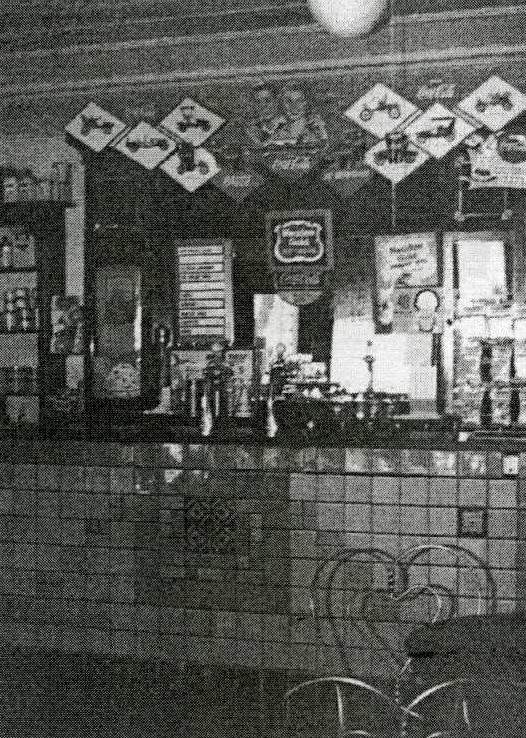
Deland Drug Store
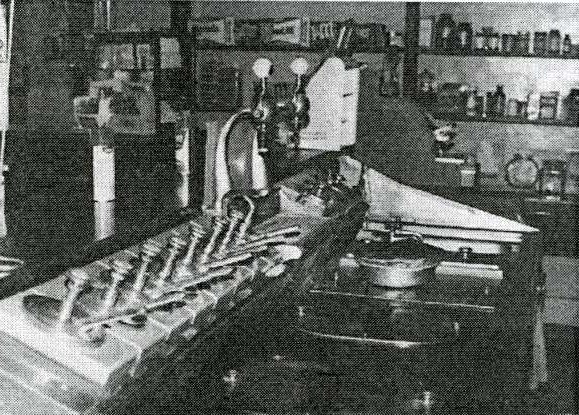
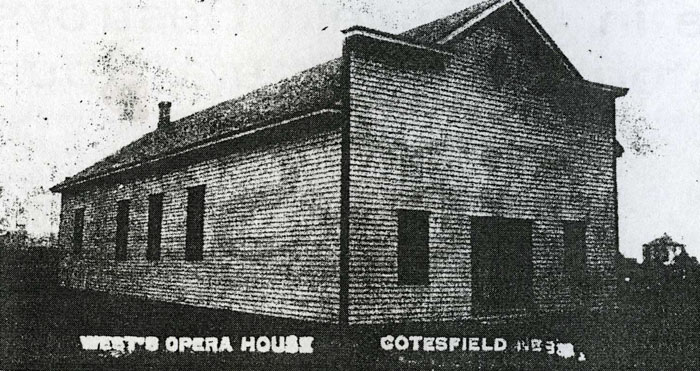
West's Opera House
c. 1908, later owned by Harry Deland. Home for visiting theatrical
stock companies, regional dance orchestras and for showing movies.

1911
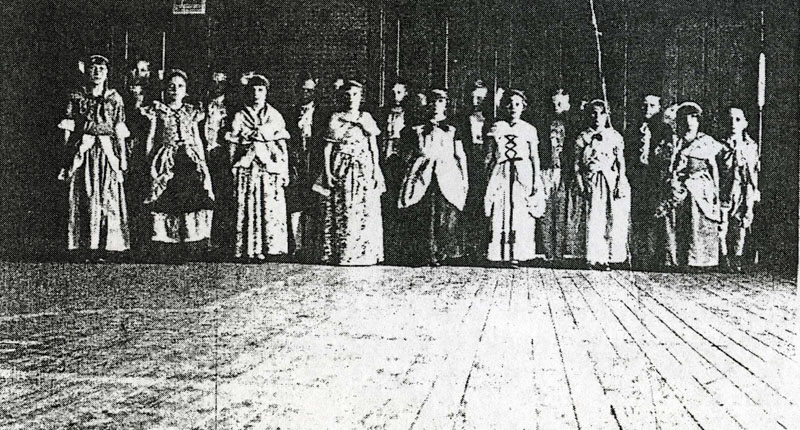
Performers for
school play, circa 1930.
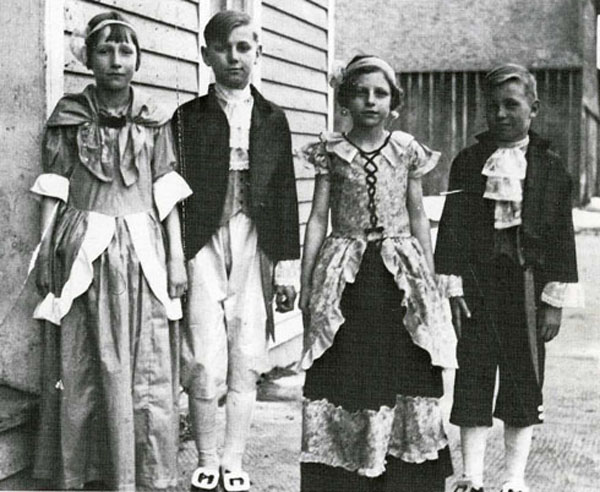
Pilgrim play performers,
Axel on far right. Axel's sister Fern on far left.

Cotesfield
News: The Phonograph, St. Paul, Nebraska April 29, 1931
My mom and sisters had their own
social groups which included gathering with my aunts to quilt
or can meats and fruits and vegetables, activities that might
seem more like work than entertainment but I think because of
the social interaction were nonetheless events that they looked
forward to.
I can remember the patchwork quilts
that my mom made from left-over fabrics she had used for shirts
and dresses that were both colorful and warm.
Much of my own entertainment was
self-generated. I played a large variety of marble games - a
circle or 5 hole box shaped in a 5 foot square with a long marked
line for lagging to see who could get the closest. I had a bag
of marbles with my favorite shooters. WIth special friends I
might gamble my shooters in an attempt to get one of their prized
marbles.
Another activity was based on
a circle drawn on the side of the barn that we used for target
practice throwing a rubber ball. Target practice could also
take place with a B-B gun. We played basketball with a hoop
on a pole or on the side of a building.
When school mates came out to
our farm we would sometimes ride calves in the barn. As we got
older the car became the important commodity for picnics, girling,
etc.
When I was young we used to play
alot of cards: Canasta, Pitch, Hearts, Pinochle. They were family
games and I had a pretty good time. The men played cards in
the dining room and the women fixed lunch for the men in the
kitchen. I don't remember my mother preaching to me or anyone
else that cards shouldn't be played but you knew it was there
since at some point she and my sisters stopped playing cards.
I don't think my mom and sister's
attitude about cards affected my life much but maybe it did.
You know a young mind, you get certain messages and guilts but
they may not even be that real. I never remember my Dad talking
about issues like this to me, why you do or why you don't do
something, and I don't honestly know what his opinion was about
my Mom and his daughters no longer playing cards.
Though our social life in the
1920's and 30's might not seem that exciting, and though our
family went through some very tough times during the Depression
(including losing our farm), at the time it seemed pretty good
and I looked forward to the dances, and the ballgames, the movies
and and the peanut buster ice cream at the Deland Drug Store
and the visits and meals we had with friends and relatives.
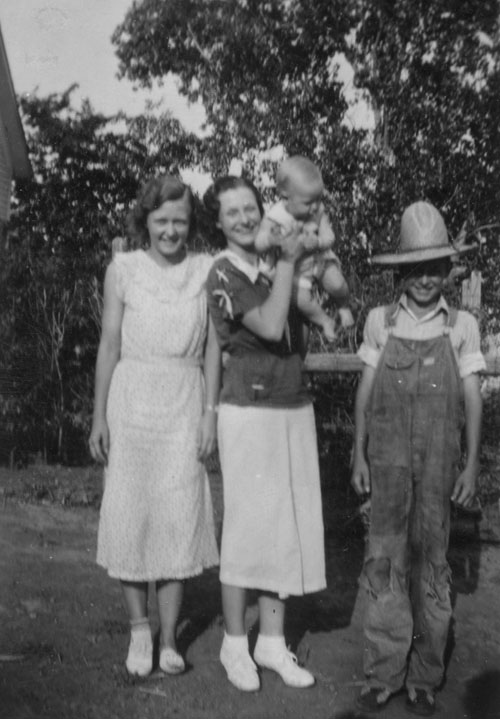
My sisters (left
to right) Lois, Fern holding my brother Garold and Axel, circa
1936

Crazy Quilt, Probably
made in Cotesfield by Mary Calvin, Howard County, Nebraska 1877-1910
73" x 68" Stuhr
Museum of the Prairie Pioneer: 1974.0122.001
The Nebraska State Historical
Society (from their 2009 exhibit "Nebraska Gone Crazy!
Crazy Quilts from Nebraska Museums" writes the following
about Crazy Quilts:
Early crazy quilts were show
pieces and were commonly draped over furniture in the public
rooms of a home. Usually foundation pieced, tied, and without
batting, these quilts were commonly made with the most opulent
fabrics available and were embellished with elaborate embroidery
stitching and fabric painting. Popular motifs were Japanese
inspired images of insects, butterflies, fish, flowers, trees
and elongated birds. Also used were designs and scenes found
in books that were sometimes made into stamping patterns.
Later crazy quilts were more
utilitarian and actually used as bedcovers. They featured
sturdy wools and cottons, had little to no decorative elements,
and were filled with batting of some sort.
DBB Note: From a popular culture
perspective I've inserted a 1925 magazine ad for the RCA Radiola
28 which retailed for $260 because it features a "barn
dance" under Japanese lanterns with elegant men and women
dancing and enjoying the music of the Radiola. Obviously this
would not have been a scene known to my dad's parents and family
in Cotesfield, Nebraska in 1925.
But when comparing the Warren-Manleys
elegant barn dance with the barn dance at Leonard Vlach's one
shouldn't underestimate the joy from an evening of getting together
with friends, live music, dancing and whatever refreshments
were being served no matter how the barn was decorated.
My dad's memory of his mother's
pleasure in getting ready for such an event and going out with
"a glow on her cheeks" is something he said that he
always remembered.
His telling of that story likewise
is something I will always remember.
